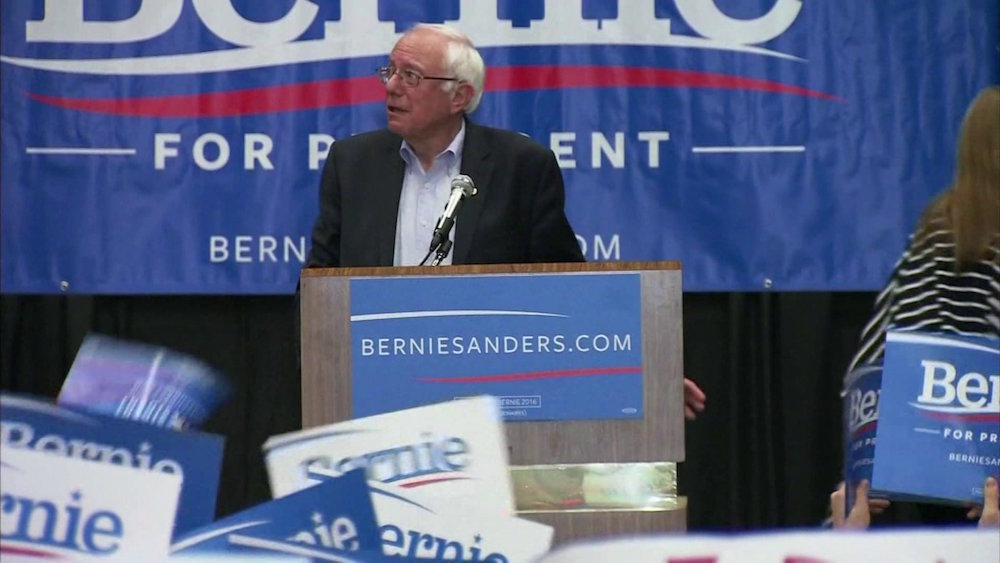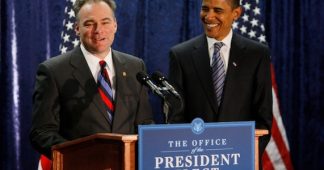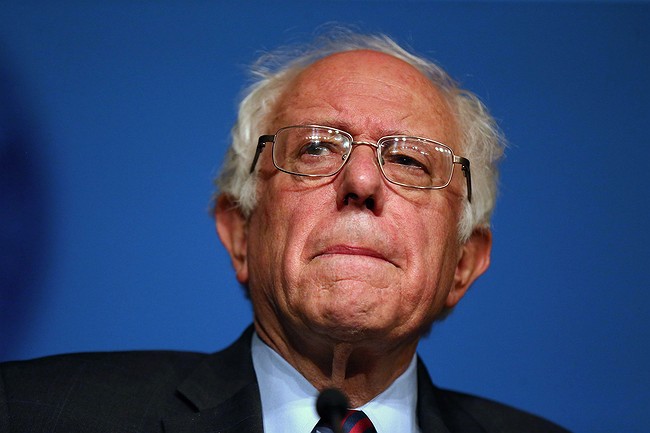The senator from Vermont explains why there is now so much interest in bold reform of America’s health-care system.
By John Nichols
September 13, 2017
Bernie Sanders has for decades argued that the United States must establish a single-payer health-care system that provides the guarantee of care for all while controlling costs—what he calls a “Medicare for All” structure. So it came as no surprise that the senator from Vermont made single payer central to his 2016 presidential bid. What is striking, Now that the campaign has finished, however, what is striking is the burgeoning interest on the part of prominent Democrats in a reform that was once considered “too bold.” As Sanders prepared to introduce a detailed “Medicare for All” bill on Wednesday, Democratic senators from across the country and from across the ideological spectrum—including Elizabeth Warren of Massachusetts, Jeff Merkley of Oregon, Kamala Harris of California, Cory Booker of New Jersey, and Kirsten Gillibrand of New York—announced that they would be signing on as cosponsors. Unions such as National Nurses United were declaring their enthusiastic support for the measure. Congressman John Conyers, D-Michigan, was cheering on his longtime ally’s Senate proposal, while celebrating a surge in support for his own single-payer legislation in the House. And media coverage, while still too dismissive of real reform and too obsessed with disputes over the direction of the Democratic Party, afforded the plan dramatically more attention than previous efforts.
The Nation sat down with Sanders in his Capitol Hill office as he was preparing his legislation and asked him to explain why single payer is suddenly being embraced by top Democrats, and why so many Americans are expressing interest in going big when it comes to issues of health-care access and affordability.
The Nation: Why do you think single payer is gaining so much traction at this point? Your campaign certainly increased interest in the movement for a “Medicare for All” reform. But there’s more to it than that, isn’t there?
Bernie Sanders: I think its a combination of factors. Number one, obviously, we have had this Republican effort to destroy the Affordable Care Act. It gives people a sense of what is at stake when we make decisions about health care. I think that many people, even now, do not appreciate the impact that [repealing the ACA] would have on the country.
When I talk about many thousands of people dying every single year, and massive amounts of suffering, that is the truth. And what this [Republican] effort is about is not just the desire for tax breaks on the part of the rich, this is the fulfillment of the Koch brothers’ ideology to destroy virtually every government program. This is the beginning. If they are successful in destroying Medicaid, Medicare certainly will be next and Social Security not far behind that—and the Veterans Administration, as well. So this is part of a massive effort by the Koch brothers and other billionaires to take us back to the 1920s and to do away with virtually every major piece of legislation passed since the 1930s to meet the needs of our people.
TN: So do you believe in a ricochet effect in politics, where if one party (in this case the Republicans) goes to extremes on an issue like health care, that they ultimately open up a debate that creates space for the other party to make bolder proposals for alternatives such as single payer?
BS: I think the immediate impact of the Republican efforts is to make people realize that Donald Trump lied to them during the campaign. That’s the immediate political impact. In other words, this is a guy who said: We’re going to come up with a health-care plan that will provide health care to “everybody,” it’s going to be “great,” we’re going to “take on the pharmaceutical industry,” we’re going to “take on the establishment.” Well, I think more and more people understand that it turned out to be an entire pack of lies. He never had any intention of doing that at all.
So the first ricochet, the first response, is that people understand that Trump was not interested in providing health care to everybody. In fact, he is supporting efforts to throw 20 million people off health insurance.
But it doesn’t stop there. You do have a circumstance where people are thinking a lot about health care, about how to get it right.
TN: In a moment like this, where the protections that do exist are under assault, there are those who say that energy has to be focused primarily on resisting the assault. But what’s notable is that so many Americans are saying that, as part of the resistance, they want Democrats to offer a clear alternative to the Republican agenda. A lot more people are looking at single payer as that alternative. Do you think your presidential run was a factor in this?
BS: Single payer has been around for decades, there’s no question about that. The reason it has remained alive and continuously discussed is because it is a rational health-care system. It’s a health-care system designed to provide health care to all people as a right—and to do that in a cost-effective way. That’s why the idea of it, the idea that this response has to be considered, has sustained itself for decades.
Do I think our campaign played a role [in giving the proposal a higher profile]? Well, I talked about single payer in every speech that I gave. And I also talked about the weaknesses of the Affordable Care Act. That’s how I tried to address these issues.
So what I think you’re seeing now is this:
A. The savage Republican attack, this effort to throw over 20 million people off the health insurance they have, people are resisting that.
B. People also understand that the Affordable Care Act did not go far enough. No one will tell you that deductibles are not too high, that co-payments are not too high, that premiums are not too high. The price of prescription drugs is totally unacceptable. Everybody acknowledges that. The Affordable Care Act did not resolve those issues.
People are saying, OK, we made some progress. Twenty million more people have health insurance, that’s important; in states like Kentucky and West Virginia, the number of uninsured plummeted, that is a good thing. But has health-care reform gone anywhere near far enough? The answer is that it has not.
So now people are saying: What is the alternative? And then, suddenly, a lot of people are saying: You know what, maybe we should join every other major country on earth in guaranteeing health care for all people. The good news for us is, we’re not proposing some kind of radical idea. I live 50 miles away—five zero—50 miles away from Canada; they, without any big deal, under Liberal governments, under Conservative governments, they have a health-care system that is far more cost-effective than ours, that guarantees health care to all people with prescription-drug costs that are far lower.
It’s not just Canada, obviously. It’s every major country in Europe. Each system is different, but they all have the characteristics of being universal [everybody is covered], private insurance companies are not involved in the basic health-care package for the purpose of making profits, prescription-drug costs are much lower.
People hear that—and they increasingly do hear that—and they say: Yes, we have got to move in that direction.
TN: So there’s the political side and the personal side. People are opposed to what Trump and the Republicans are doing, but they also recognize a need for a new approach to health care. Is that right?
BS: I think the evolution of health care in America—where today if you’re an ordinary person, with say a four-person family, you might be paying $15,000 or $20,000 a year for health insurance; where employers are paying a fortune, where deductibles are too high, premiums are too high, prescription drugs are too high—people are looking around and they’re saying: This is not working; we need to move in a different direction.
You combine that with the outrageous profits that the pharmaceutical industry is making, profits that the insurance companies are making; the high CEO salaries and compensation that these guys are getting; the fraudulent activity on the part of many people in the medical industry. Americans are saying: Enough is enough!
There is no question that the momentum is with us, and we are going to help lead that effort. But we have to understand that this is going to be a really, really tough fight, a very tough fight. We’ve got to be smart about it. Already, before the legislation was introduced, Republicans have made it clear that they see this as an opportunity to frighten the American people—by telling them that their taxes are going to go way up…
TN: Claiming that it will cost tens of trillions…
BS: Yes, you’ve got some group that comes up with some figure. And what they of course are neglecting to mention is that, if you are now paying $15,000 or $20,000 for health insurance, you’re not going to have to pay that. So if I said to you, “You’re not going to have to pay $15,000 or $20,000 for health insurance, but you’re going to pay somewhat more in taxes,” you’d say, “Hey, that’s a great deal; sign me up.” But we’re going to see many, many millions of dollars spent to try to hide that simple fact. So, if you read The Washington Post, all they will talk about is the amount of new revenue that is being needed. They will not talk about the fact that the average family, if we fund this thing in a progressive way, will end up being much better off financially, because the amount of taxes they may have to pay will be significantly less than the amount they are saving on what they are paying for health insurance.
But there should be no question about this, Republicans and the insurance industry and the drug companies will be spending a fortune to try and confuse the American people…. Our task is to counter the money that is spent, to counter the confusion…with a plan that responds to the needs of the great majority of the America people. That’s what single payer does.











